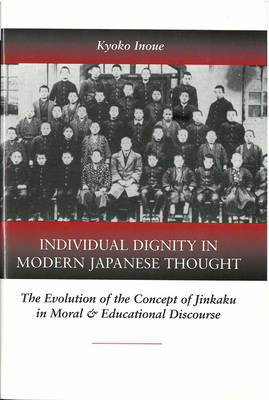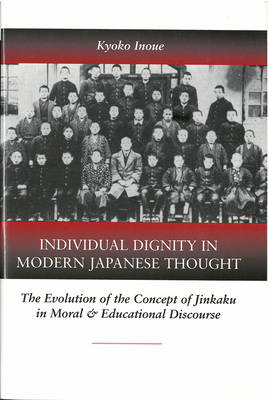
Bedankt voor het vertrouwen het afgelopen jaar! Om jou te bedanken bieden we GRATIS verzending (in België) aan op alles gedurende de hele maand januari.
- Afhalen na 1 uur in een winkel met voorraad
- In januari gratis thuislevering in België
- Ruim aanbod met 7 miljoen producten
Bedankt voor het vertrouwen het afgelopen jaar! Om jou te bedanken bieden we GRATIS verzending (in België) aan op alles gedurende de hele maand januari.
- Afhalen na 1 uur in een winkel met voorraad
- In januari gratis thuislevering in België
- Ruim aanbod met 7 miljoen producten
Zoeken
Individual Dignity in Modern Japanese Thought
The Evolution of the Concept of Jinkaku in Moral and Educational Discourse Volume 35
Kyoko Inoue
€ 101,95
+ 203 punten
Omschrijving
The American draft of the Japanese Constitution included an article declaring that each individual was entitled to respect simply by virtue of being a human being. The Japanese, however, interpreted this concept as "respect for jinkaku (moral character)."Jinkaku was a strongly elitist concept that gradually acquired more egalitarian meanings during the Taishō period. Yet the hierarchical connotations were still present when the term was used to interpret "individual dignity" in the Constitution and was later made the foundation of postwar Japanese education. As Japanese discourse began to embrace the American idea that all people are worthy of respect just because they are human beings, and thus their fundamental rights must be protected, it did not adopt the American emphasis on protecting individual rights against the government. Consonant with the ideas embodied in the Constitution, the Japanese teach that government and the people are jointly responsible for bringing about a fair and just society for all. Textbooks thus promote a communitarian rather than individualistic view of democracy.Individual Dignity in Modern Japanese Thought is important for scholars of modern Japanese intellectual history and Japanese democracy, for political scientists interested in political socialization, and for scholars of comparative history, law, politics, and education.
Specificaties
Betrokkenen
- Auteur(s):
- Uitgeverij:
Inhoud
- Aantal bladzijden:
- 274
- Taal:
- Engels
- Reeks:
- Reeksnummer:
- nr. 35
Eigenschappen
- Productcode (EAN):
- 9781929280032
- Verschijningsdatum:
- 8/08/2001
- Uitvoering:
- Hardcover
- Formaat:
- Genaaid
- Afmetingen:
- 162 mm x 237 mm
- Gewicht:
- 512 g

Alleen bij Standaard Boekhandel
+ 203 punten op je klantenkaart van Standaard Boekhandel
Beoordelingen
We publiceren alleen reviews die voldoen aan de voorwaarden voor reviews. Bekijk onze voorwaarden voor reviews.









